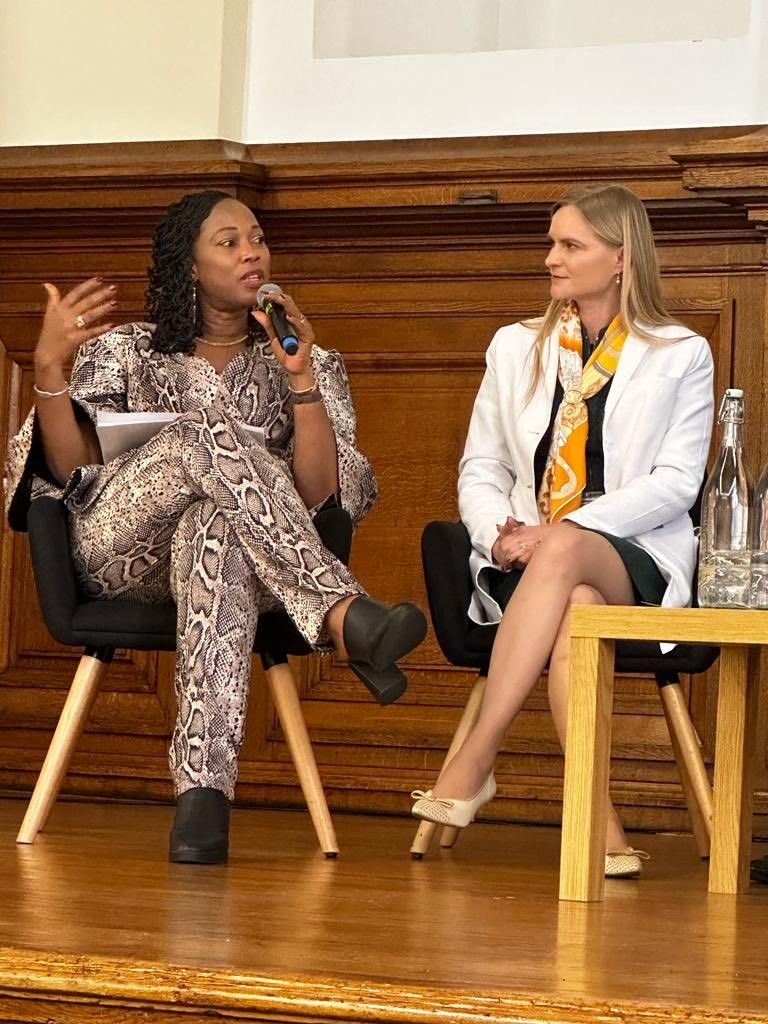AYV News, August 31, 2023
The First Lady of Sierra Leone, Dr. Fatima Maada Bio was part of a selected group of international panelists who participated in this year’s Global Leader Summit on Human Trafficking held at Central Hall Westminster, London.
The Summit is aimed at increasing the rate of Victim Identification of Human Trafficking around the world.
During a panel discussion moderated by the Chief Executive Officer of Atlas Free (USA), Jeremy Vallerand, Dr. Fatima Maada Bio exchanged meaningful ideas with Director Katherine Chon, Health and Human Services Office on Trafficking in Persons (USA), Arnold Viersen MP (Canada) and Dr. Ekaterina Kostioukhina, M.D. (Lived Experience Expert – New Zealand).
At the Summit, participants agreed that whereas human trafficking stands as the second largest criminal enterprise, generating approximately $150 billion in profits annually for traffickers and also that whereas the reality persists that less than one half of 1% of human trafficking victims are ever identified, hindering their access to healing and justice.
Participants further agreed that whereas victim identification and reporting serve as the foremost steps in the survivor’s path to recovery and the imperative pursuit of traffickers’ accountability and whereas the primary interaction with victims often occurs within specific sectors, such as health care, schools, foster care, law enforcement, and prosecution.
Additionally, the Summit agreed that whereas adequate human trafficking prevention education and training for professionals in these sectors is critical to build their capacity to recognise and respond effectively to human trafficking situations.
The assembled members of this global conference on combating human trafficking, hereby commit to intensifying efforts in victim identification through collaborative sectoral training and reporting mechanisms.
“Establishment of Comprehensive Prevention Education and Training Programs: We recognize the paramount importance of providing comprehensive human trafficking prevention education and training to professionals within health care facilities, educational institutions, foster care systems, law enforcement agencies, and prosecution authorities. These educational and training programs shall be designed to equip personnel with the necessary skills and knowledge to identify and support potential victims of human trafficking.
“Encourage Survivor Leadership within Government and Civil Society: We recognize the importance of leadership by individuals with lived experience in the development and implementation of policies and legislation on human trafficking. We acknowledge that trauma-informed education, training, victim identification, and survivor restoration strategies must be implemented within our countries in order to invest in the dignity and empowerment of survivors.
“We support the belief that trauma-informed steps should be established within each nation for eventual partnerships with survivors of trafficking to advise and make national recommendations about anti-trafficking policies, programs and best-practices. We further acknowledge that partnerships with lived-experience experts is crucial for development and implementation of anti-trafficking policies, programs and standards of practice.
“Promoting Awareness and Community Engagement: We affirm the importance of raising public awareness about human trafficking and its signs. We pledge to engage communities in the fight against human trafficking, encouraging them to be vigilant and report suspicious activities, while ensuring that support and protection are provided to the victims who are identified.
“Multidisciplinary Collaboration: We emphasize the significance of fostering collaboration among diverse sectors to address human trafficking effectively. Healthcare providers, educators, social workers, law enforcement officers, and prosecutors shall work together, sharing information and expertise to enhance victim identification and reporting.
“Encouraging International Cooperation: We recognize that human trafficking is a transnational issue and that cooperation among countries is indispensable in tackling this crime and addressing this humanitarian issue. We urge governments and international organizations to collaborate, share best practices, and provide mutual support in identifying and assisting victims across borders.
“Allocating Resources: We call upon governments and stakeholders to allocate sufficient resources to support the implementation of education and training programs, awareness campaigns, reporting systems, and victim support initiatives. Adequate funding is vital to ensuring the success of our collective efforts”  the Summit noted.
the Summit noted.
In closing, the participants pledge to prioritise anti-trafficking laws and policies which strengthen victim identification through collaborative sectoral training and reporting and aim to end human trafficking, protect the vulnerable, and provide survivors with the opportunities they deserve to heal and thrive.

